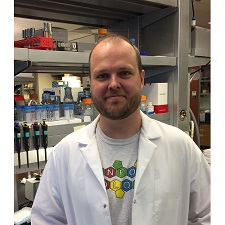Dr. Dixon aims to determine whether the altered metabolism of cancer cells creates new vulnerabilities that can exploited therapeutically. “Reductive stress” is a cellular concept in which too much glutathione could lead to cell growth arrest and death. He is investigating how a gene called NRF2 balances the demand for new glutathione synthesis with the need to avoid glutathione-mediated reductive stress. Reductive stress-mediated protein unfolding and aggregation may burden the protein folding and stress response machineries and explain, in part, the heightened sensitivity of cancer cells to inhibitors of these pathways. Thus, his work could also suggest new approaches to selectively eliminate cancers with mutations that lead to high NRF2 expression, using agents that enhance reductive stress. His central goal is to characterize cell-specific metabolic alterations and seek new ways to exploit these differences therapeutically.
Damon Runyon Researchers
Meet Our Scientists
Scott J. Dixon, PhD
Project title: "Exploring the role of reductive stress in promoting cancer cell death"
Institution: Stanford University
Award Program: Innovator
Cancer Type: All Cancers
Research Area: Cell Death







